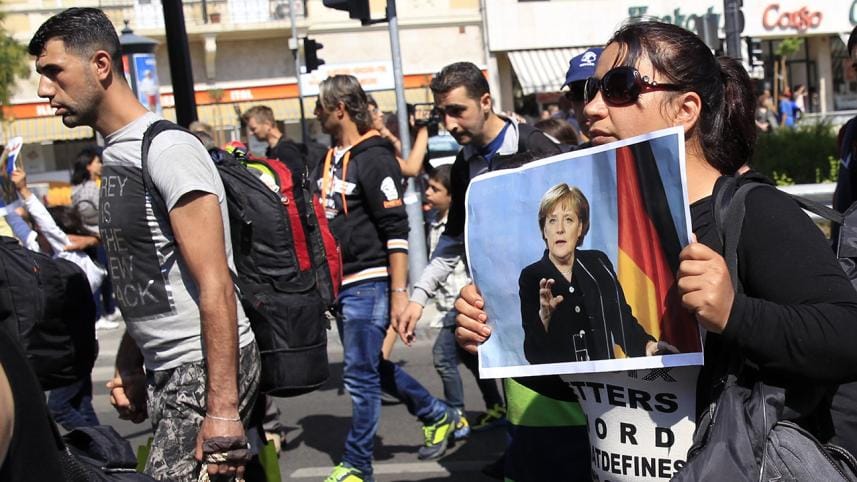Migrants break out of camp as Hungary loses grip

- Migrants break out of camp on border with Serbia
- Police give chase, closing motorway to traffic
- Hundreds stranded on train west of Budapest
- Others set off on foot, saying will walk to Austria
Hundreds of migrants broke out of a Hungarian border camp on Friday and others set off on foot from Budapest as authorities scrambled to contain a migrant crisis that has brought Europe's asylum system to breaking point.
Police said they had given chase and halted traffic on a nearby motorway after some 300 migrants fled a crowded reception centre in Roszke on Hungary's southern border with Serbia.
They said another 2,300 migrants still inside were threatening to break out too, and the MTI state news agency said dozens more had fled a second camp west of Budapest in the town of Bicske.
Hungary says it is enforcing European Union rules that it must register all migrants caught crossing Hungary's borders, but thousands are refusing and demand they be allowed to continue their journey to western Europe from war and poverty in the Middle East, Africa and Asia.
Many are refugees from Syria.
In Bicske, some 500 migrants were spending a second day stranded on a train at the local railway station, refusing the demands of riot police that they disembark and go to a nearby migrant reception centre.
"No camp. No Hungary. Freedom train," someone had written with shaving foam on the side of the train. Sanitary conditions were deteriorating fast in the late summer heat.
The right-wing government of Prime Minister Viktor Orban has vowed to take control of Europe's worst migration crisis since the Yugoslav wars of the 1990s, promising to seal the country off within days to a flow of migrants that has topped 140,000 this year.
Hungary has become a flashpoint in the crisis as the main entry point into the Europe's Schengen zone of passport-free travel for migrants travelling over land across the Balkan peninsula to reach richer and more generous countries further north and west, above all Germany.
Lawmakers moved to tighten migration laws that the government says will cut illegal entry to zero as of Sept. 15 by creating "transit zones" on the border where asylum seekers would be held until their requests are processed, and deported if denied.
The measures introduce jail terms for those who cross the border without permission or damage a fence that Hungary is building along its 175-km frontier with Serbia.
But Budapest's hard line has produced scenes of chaos and desperation this week, symbolic of the discord and recriminations within a divided Europe over how to respond.
March to Austria
In Bicske, a Reuters reporter said migrants holding out on the train told police that women and children in their group would leave for the border on foot on Saturday if the train was not allowed to continue its journey.
"We don't know what's going on," said Ahmed Mahmoud, 60, who said he was a former Iraqi military officer who had lost both legs and was trying to join his daughter in Belgium.
"The police told us, get fingerprinted or face jail time. So we gave our fingerprints and they told us we can go. But we can't go to the west. I just want to see my child in Belgium."
The European Union normally allows free movement between the 26 countries of its Schengen border-free zone, but its rules require asylum seekers to register in the first country where they arrive and remain until they are processed.
Over 1,000 have been camped outside Budapest's Keleti railway station after Hungary this week cancelled all trains to western Europe. A group of between 400 and 500 migrants, led by a Syrian man, marched through the capital, saying they too would walk to Austria.
Hungary's right-wing prime minister, Viktor Orban, took to the airwaves to defend his country's stance, saying Budapest was defending Europe's Schengen zone from a huge influx of migrants escaping war and poverty for Europe by rickety boat across the Mediterranean or by land across the Balkans.
Hungary has hit out at Germany, which expects to receive 800,000 asylum seekers this year, for saying it would accept requests from Syrians regardless of where they entered the European Union, contrary to EU rules. Orban's government says this is spurring the flight, which he says poses a threat to Europe's "Christian values".
"Now we talk about hundreds of thousands but next year we will talk about millions and there is no end to this," Orban told public radio in a regular Friday interview.
"All of a sudden we will see that we are in a minority in our own continent."
He said "everyone" should prepare for Sept. 15, when the new measures adopted by parliament would be in place, potentially involving the army in defending the border.
"Serbia, Macedonia, the immigrants, the human traffickers. We ourselves will prepare for this, and a different era will start from Sept 15."
 For all latest news, follow The Daily Star's Google News channel.
For all latest news, follow The Daily Star's Google News channel.
Comments